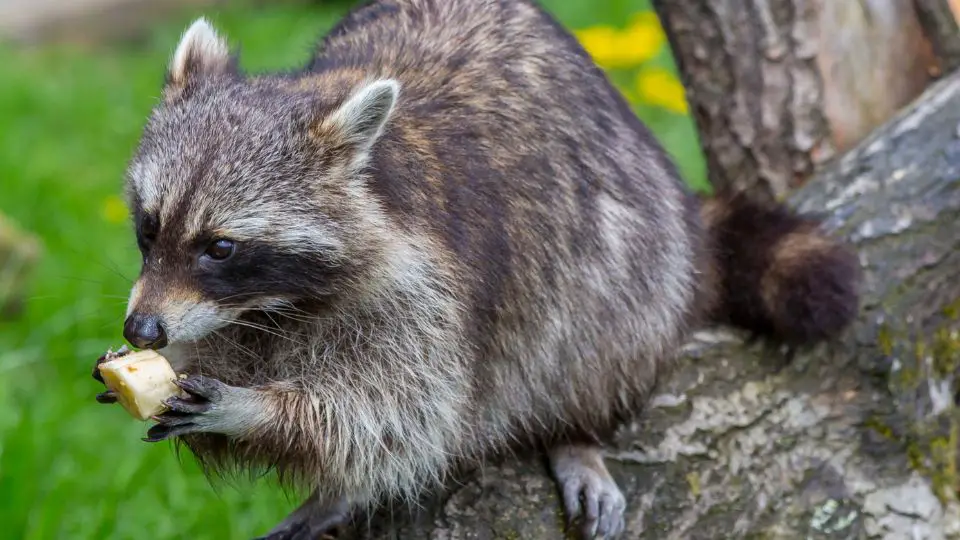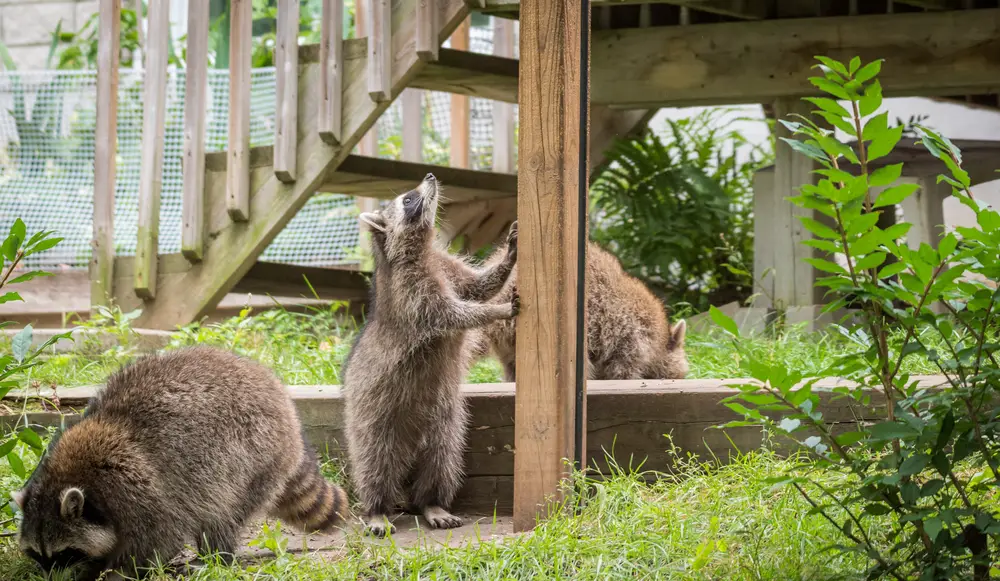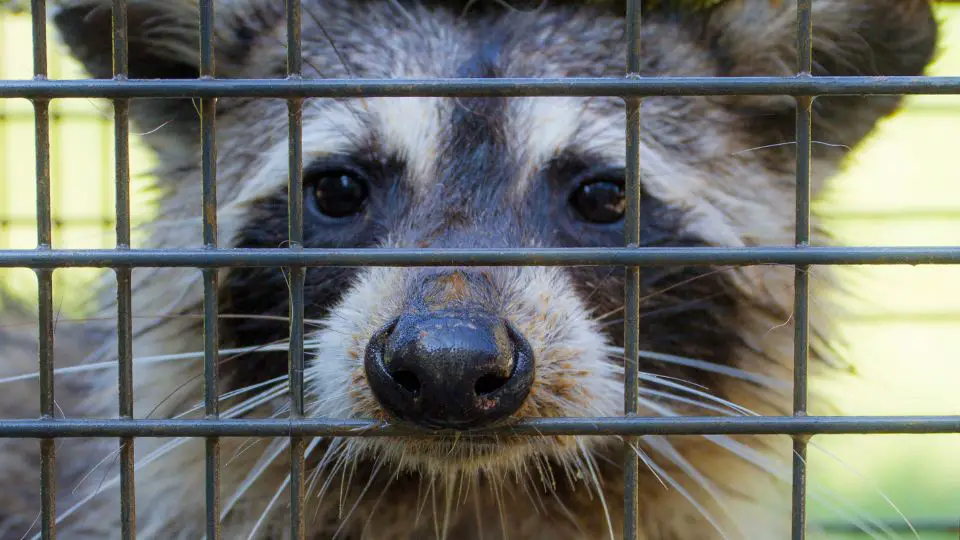To safely and humanely trap a raccoon, use a live trap. Place the trap in a covered location where you have noticed their activity. You can successfully catch a raccoon using bait they enjoy, like marshmallows. After setting the trap, be patient since catching a raccoon can take several days.
Table of Contents
What is the best bait for raccoon trapping?
To successfully and safely trap a raccoon, use foods that are non-toxic to raccoons to lure them into the cage trap. Be sure to place the bait at the back of the trap so that the raccoon will step on the trigger plate to reach the food.
Below is a list of foods that can be used as raccoon bait:
- Marshmallows
- Wet cat food
- Bacon
- Fruit
- Tuna
- Eggs
- Salmon
- Corn
Marshmallows are a popular bait option for raccoons because the sticky texture makes it difficult for the raccoon to escape the trap. Alternatively, any meaty foods will lure raccoons.
Raw meat will not cause harm to raccoons, so the meat used as bait can be either cooked or uncooked. Any type of fish is appealing to them, too. Make sure you pick meats and fish with strong smells.
Canned fish can be placed directly into the trap as bait. A whole, uncooked egg can be used as bait for a raccoon trap. Raccoons have been known to attack chicken coops, and one of the reasons they do so is to eat their eggs.
Although raccoons are omnivores and will eat almost anything, some foods are toxic to them. Chocolate, onions, raisins, coffee, and avocados are some foods that will cause health issues in raccoons.
To catch a raccoon humanely, those types of foods should not be used as bait. Neither should any foods with high amounts of sugar be used as bait, such as cake and cookies.

What food is irresistible to raccoons?
Sweet foods and fatty meats are irresistible to raccoons. Raccoons love fruits and vegetables, but they especially prefer sweet fruits and vegetables.
Other sweet options include watermelon and sweet corn. Sugar or honey-coated fruits or vegetables will be more appealing to them than regular fruits and vegetables.
To lure in raccoons with sweet meat, place crispy bacon glazed with honey in the trap. The smell of the honey and the meat is sure to appeal to a raccoon.
How do you trap a smart raccoon?
Sometimes it is difficult to trap critters as they are smart enough to know they are trying to be trapped. The location and appearance of the trap is an essential part of successfully catching a raccoon. Don’t place the trap in an open, uncovered area.
One way to trick raccoons into the trap is to disguise the trap with foliage. Putting the trap under a bush or purchasing a camouflaged trap will make the raccoon less likely to be suspicious of it. You can also cover over the trap with branches, leaves, or rocks.
Another tip to catch an intelligent raccoon is to place the trap near a water source. Raccoons do actually wash their food before eating it, so if they know there is food and water in the same location, it will be particularly convenient and appealing.
You can also place the trap in the location in which you have noticed raccoon activity. Traps could be placed around your fence, porch, or alongside your house.
If you have trouble catching a raccoon, you may have to train it to trust the cage first. Here’s how to do this:
- Place the trap in your yard
- Don’t set it yet.
- Scatter bait inside and around the trap
With the trap not being set yet, the raccoon will enter the cage to get the food and then leave. Keep placing bait inside the trap to keep it coming back for more. After a few days, the raccoon will trust the cage, and then you can set it.

How do you get a raccoon without a trap?
You can use items in your home to create a homemade trap. Here’s what you need.
- Tall trash can
- Table taller than trash can
- 2 x 4 board
- Bait
Items in hand, then do the following:
- Fill trashcan 1/3 full with water
- Place the two-by-four on to table
- Hang part of two-by-four over trashcan
- Place bait on end of board
The goal is that when the raccoon walks across the board to get the bait, it will tip. As result, the raccoon will fall into the water. You can spread some peanut butter on the end of the board hanging over the trashcan.
The water in the vessel is important because, without water, the raccoon will crawl out of the bucket. The liquid makes its fur heavy and prevents its claws from gaining traction.
Are raccoon traps effective?
Raccoon traps are effective when set up correctly. Setting up the trap in an ideal location and using appropriate bait help make it more effective.
Purchased traps will come with instructions on how to set up the trap. Be sure to carefully follow the instructions for maximum effectiveness.
Not setting up the trap correctly may result in the raccoon stealing the bait and escaping. Live cage traps are effective, but you may catch a different critter other than a raccoon.
For example, you may catch a skunk or an opossum instead. If this occurs, follow through with your catch-release plan. You will then want to clean the cage to ensure you don’t transmit diseases from the non-target animal to the raccoon.
Using a live trap also risks catching a domesticated animal such as a stray cat. Ensuring the safety of other animals is another reason it is essential to use this humane type of trap.
How do I get rid of raccoons?
Raccoons are pests that homeowners don’t want on their property because of the damage they cause and the diseases they carry. Before attempting to catch a raccoon, you can try other ways to repel them first.
Or maybe you have caught a raccoon and want to ensure you won’t have a raccoon problem again. One sure way to keep raccoons away is to make your yard unappealing to them.
Raccoons are known for digging through garbage, so securing your garbage cans and keeping trash inside is one way to eliminate raccoon activity. You can purchase rodent-repelling trash bags. These trash bags use scents that raccoons hate.
Removing other available food sources, such as pet food or bird seed, is another step that will help. Keep pet food inside and invest in a pest-free bird feeder. To keep raccoons out of your garden, use homemade repellents.
Sprinkle garlic and chili powder around your plants. Raccoons dislike strong odors and will go elsewhere when they experience them. If this doesn’t work, it is always an option to contact a pest control company for help with removing raccoons.

How long will it take to catch a raccoon in a trap?
It can take several minutes or several days to catch a raccoon in a live animal trap. The amount of time it may take depends on many factors, including time of year and type of raccoon. A certain raccoon may be more cage shy than another raccoon.
If it is taking several days to catch the raccoon, be sure to be replacing or changing the bait every three days. If one bait is not working, try a different one. You can also try putting the trap in a different location.
However, remember to be patient. Catching a wild animal requires patience as it is difficult to predict how long it will take. Check the trap every three to four hours.
Try to check the trap from a distant location, like a window inside your house. If the raccoon sees you around the trap, it will decrease the chances of the raccoon approaching the cage.
It is vital to keep checking the cage, because you shouldn’t leave an animal in a cage for very long. A trapped animal will become scared and anxious in the cage, so relocate it as soon as possible after catching it.

